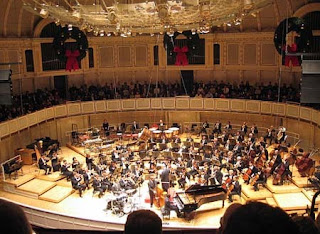
While it's nice sitting comfortably in my house all day sipping beer and listening to whatever I feel like hearing at the moment on Grooveshark.com (greatest. website. ever.), last night I had the occasion to hear my first world class symphonic performance with the Chicago Symphony Orchestra.
My hometown of Cincinnati is not without its own orchestra, but the Chicago Symphony is quite a step above, arguably one of the top orchestras in the entire world. It's a special treat to be able to see such a fine show of musical talent, and in some ways, amazing that I've waited until now to do so.
As I await attending the Bonnaroo Music Festival next week, perhaps the polar opposite musical experience of the CSO, I find myself pondering the significance of actually attending a symphony. Certainly, the programme was not the only draw - after all, I'd heard most of, if not all of the pieces before (Beethoven's 8th Symphony, the Overture to Beethoven's Fidelio, and for the finale, Beethoven's immortal 5th Symphony), and done by world class orchestras in their own right (perhaps I'd even heard a recording of the CSO doing some of the works). And surely, the recordings must have been a better sound quality after going through the rigor of a studio editing session.
But as I sat in a seat and awaited the start of the evening, I realized that I was about to not just hear music, but to experience it. The conductor or principal violin player comes onto the stage and the audience gives unsolicited applause, before even a note of music has been played. It's as if they are clapping not for the music itself, but as acknowledgement of the lifetime of practice and study spent in preparation for this one moment.
That's the key to what I took away from my trip to the symphony. I expect that next week, when I go to Bonnaroo, despite a massively larger audience, and hundreds of thousands of dollars being poured into creating elaborate light shows, costumes, and stagings, the emphasis will not really be on the music. People will be cheering for the musicians, but at the same time holding beer bottles and toking on reefers. This doesn't compare to the near-holiness that symphonic audiences seem to put on what they listen to. Symphony halls are like cathedrals, and audiences have a stringent adherence to etiquette, even refraining from coughing until the end of a movement so as not to spoil the melody (it's amazing fun to see how the auditorium turns into a hospital ward between movements as patrons try to cram their coughing into a minimal five-to-ten-second space). This seeming stuffiness may be why classical music is so unpopular amongst younger, diverse audiences, but it's also what makes the symphonic experience so special. Here is perhaps the one instance where a person is asked to just listen to and respect the music being played. It's not like having music on in the background while you have a good conversation, or even like attending a rock concert where your concentration is more on the party than the sound (not that there's anything wrong with that).
What the symphony does is command that those who attend study the music attentively, listen for subtle colorings and counter-melodies and transitions that add complexity to music. And in this way, one comes to better appreciate all music in general. While one can still enjoy modern music like, say, Jurassic 5 based on the catchiness of the beats and the flow of the rhymes, being able to latch onto nuances in the rhythms or appreciate a solid composition makes it a transcendent experience, and for me, the entrance into that kind of appreciation came from classical music. It's a mistake to think that all music is not interconnected. Old audiences who dismiss rap as an "other" and young audiences who blindly dismiss classical music as boring, are both missing worlds of musical experiences that inevitably enrich the soul (now we're really getting high-falutin').
The key is forcing oneself to really pay attention to what you are listening to. Symphonies acknowledge that you can't really appreciate what you're listening to unless you are just listening to it. To be sure, there's a non-auditory element of performance to a symphony - it's exciting and mesmerizing to see all the bows moving to and fro in unison, or to watch a conductor as he calls for a particular kind of coloring to the notes played - but for the most part, it is nothing more than an acknowledgement of the importance of music to our lives. There's something beautiful and primal about that.
As a seller of classical music subscriptions, I often encounter old ladies who are frustrated by the informality with which some people attend the symphony. For them, polo shirts, khaki shorts, and Birkenstocks have no place in their musical Church. To many people, that might seem uptight and ridiculous, but one can't argue that they have some founding in their sadness at the decay of an experience that, for them, is holy. And you also can't argue that deep, deep appreciation for the classics brings some sort of Enlightenment to their lives, in the same way that deep appreciation of rock or techno or jazz does to others. Music is a universal language and I would argue that a trip to the symphony helps one learn to speak it.



No comments:
Post a Comment